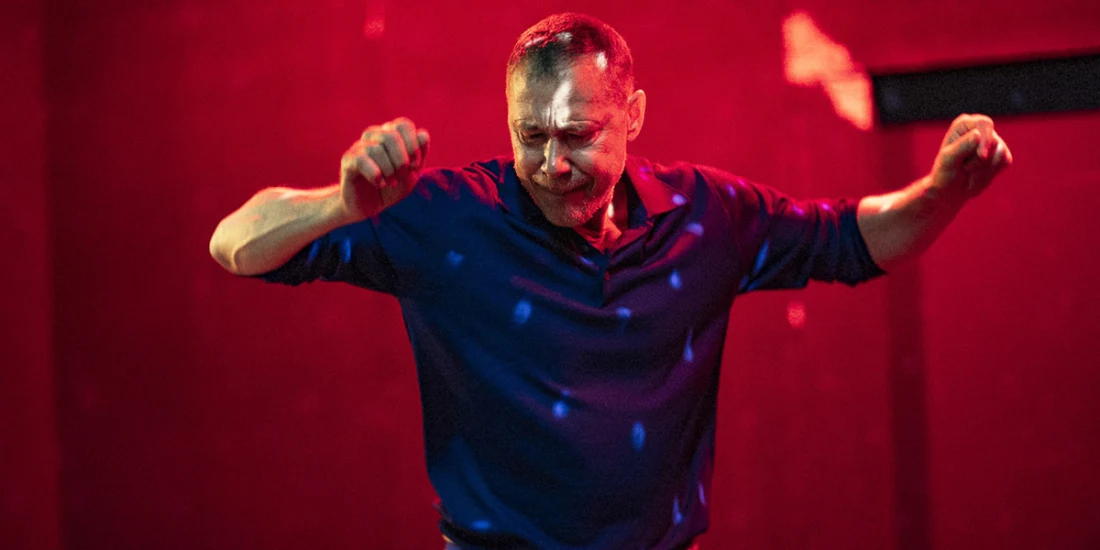'Who Killed My Father' review — Ivo van Hove directs a singular feat of commitment and endurance
There’s no denying the novelistic origins of Who Killed My Father, the solo marathon that the superb Dutch actor Hans Kesting has brought to the Young Vic for a limited run, under the ever-incisive directorial eye of Ivo van Hove.
This is the same venue, of course, where van Hove made his leap to auteur-director stardom in 2014. That was due to his revelatory, stripped-back revival of A View from the Bridge, which transferred to the West End and to Broadway, garnering kudos and trophies along the way.
Van Hove’s return to the Waterloo address is with the English-language premiere of a more compressed and gruelling work: a 90-minute adaptation by the director of Who Killed My Father, the 2018 novel by the young Frenchman Édouard Louis who turns 30 next month.
Performed in English by Kesting, the result is a singular feat of both commitment and endurance, doubly so on a press night that found the actor taking the stage before an audience just coming to grips with the announcement within the previous half hour of the death of the Queen. (The show was preceded by a minute’s silence and the option — which no one took up — to leave the auditorium if anyone was too shaken by the news.)
With designer Jan Versweyveld’s lighting slicing the air like a scythe, the story collapses time to tell of an abusive father and a conflicted son coming to terms with domestic violence and his own homosexuality. Kesting plays both parts in a virtuosic turn from one of the most memorable Mark Antonys in my experience – that formed part of a livestream early in 2021 of van Hove’s Roman Tragedies, a daylong triptych that included Antony and Cleopatra.
Boyish yet rugged, appearing primed for battle yet emotionally fragile, Kesting readily shifts demeanour and mood as the narrative moves on from personal recollection to acknowledge the film Titanic on the one hand and the collapse of the twin towers on the other.
A further nod towards the Holocaust constitutes arguably too great a reach as the writing then broadens out from the political to the social and on to the political: the closing passages take an angry view of the reduction in French housing benefits in 2017, the climactic call for revolution at some remove from the father-son relationship that dominates from the start.
The grimly industrial design conveys the factory town environs of a working-class father ensnared in a cycle of violence that leaves its toxic imprint on six children (maybe, in fact, seven, we are told). Kesting more than once is seen illuminated in a doorway that seems itself to breathe fire: an appropriate image for the furious bouts of cigarette smoking on view that shroud the concrete bunker of a set in the haze of memory.
One welcomes attempts to elevate the extended reportage – that’s to say, events described but rarely dramatised – with a burst of stagecraft: the slamming-shut of side panels to amplify the claustrophobia or the swelling sounds of a speeding car on a country road to get at the essence of this (literally) hard-driving father. Elsewhere, a glitter ball against expectation drops from the ceiling, so as to soften a deliberately austere space.
Some of the writing gets mired in an academic-sounding rhetoric that doesn’t take easy wing onstage. Talk of “constricting your masculinity” makes the heart sink, and you sometimes wish the evening would show and not simply tell of the confrontations at its core. “Your manhood has condemned you to poverty” sounds rather pretentiously apocalyptic, and there’s no denying the effort involved in locating the theatrical component within what could easily devolve into a staged thesis.
Kesting charges through regardless, taking the audience with him in a performance that is fiery yet fragile, intimate yet charged with the outsized power of something epic. At the curtain call, the open-faced actor looked moved by the engagement of the house on that most extraordinary of all nights as we emerged into a changed world in which life, for once, seemed considerably more dramatic than art.
Who Killed My Father is at the Young Vic to 24 September. Book Who Killed My Father tickets on London Theatre.
Photo credit: Hans Kesting in Who Killed My Father (Photo by Jan Versweyveld)
Originally published on

